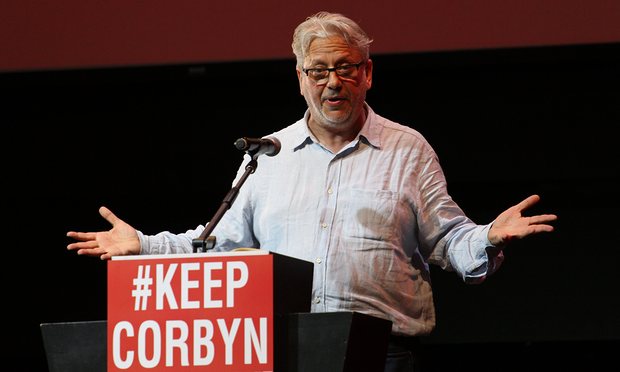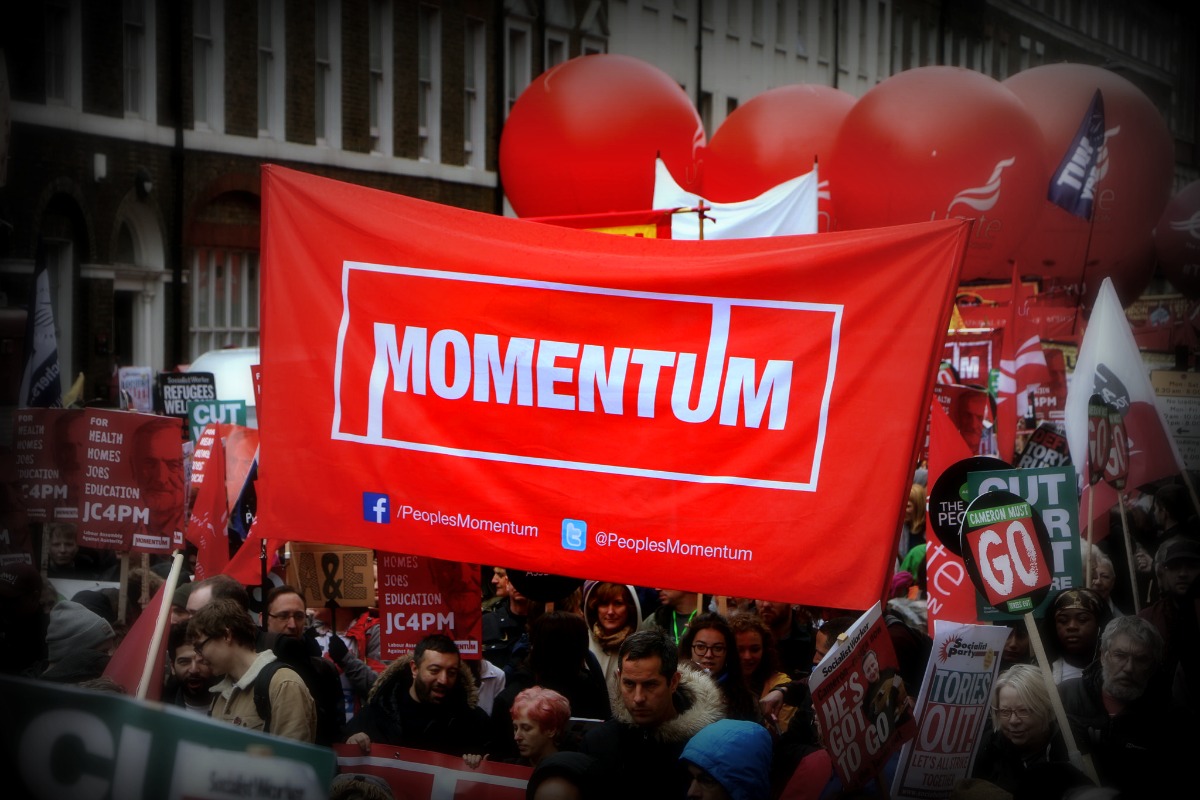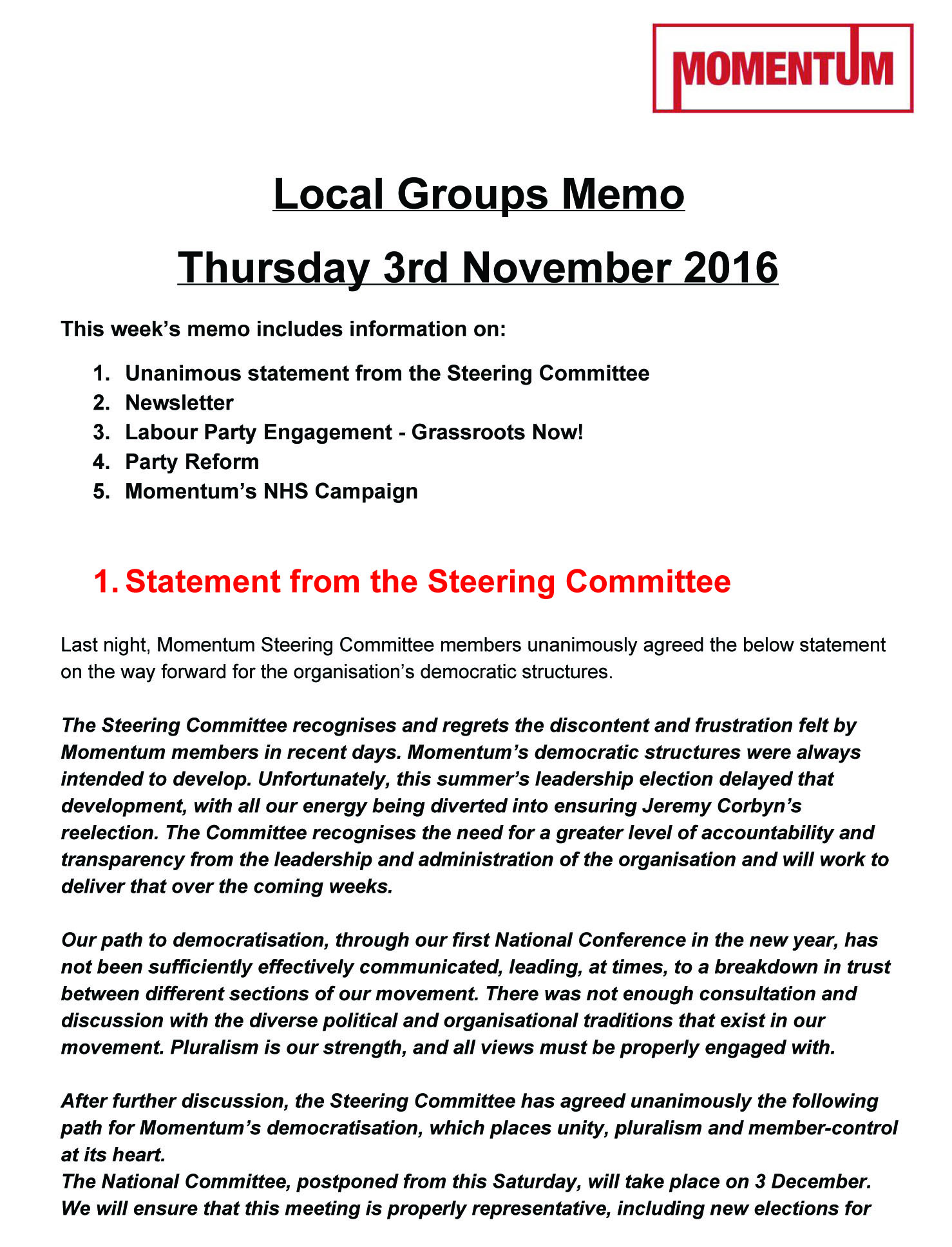Some good decisions were taken at the December 3 National Committee meeting of Momentum. However, while the Steering Committee survives intact and Jon Lansman maintains his ‘ownership’ of the organisation, Momentum is seriously flawed – as new leaks and attacks in the bourgeois media show, warns Carla Roberts of Labour Party Marxists
Around 60 members of the National Committee of Momentum met in Birmingham to discuss, among other things, the first Momentum conference. It was a very fractious and ill-tempered meeting.
Crucially, a motion to recall the current Steering Committee (which has a majority in support of sole Momentum company director Jon Lansman) and replace it with an interim body elected at the NC was voted down by 30 to 29 votes. Even three recounts could not change the outcome. Ironically, Nick Wrack had successfully moved to change the agenda so that this item was discussed first, as he feared it would be excluded because of time constraints. But had this vote been taken later in the day, it is likely that a majority would have voted in favour of it, as a number of pro-democracy members arrived later in the day.
There were some good decisions taken. Most importantly, there will be no OMOV (one member, one vote) voting at or after conference, despite this being the expressed will of Lansman. Conference will decide on a new constitution, a code of ethics and various policy motions – and all of these decisions will be taken by delegates at conference.
Fearing exactly such an outcome, Jon Lansman and his allies on the Steering Committee had successfully prevented the National Committee from meeting since May 2016. On October 28, they even launched a deeply undemocratic coup by cancelling the meeting of the NC scheduled for November 5 and simply declared that the conference would in fact be a livestreamed national debate, with voting then taking place online afterwards. When the national media picked up on the coup and Lansman was asked by John McDonell to ‘sort it out’, he relented and called another NC meeting for December 3.[i]
In the meantime, he has done pretty much everything in his power to stuff the NC with members who support his plans to make Momentum into nothing more than a big phone bank that sporadically sparks into life for this or that campaign. The hastily called elections of additional NC delegates from the “liberation strands” have to be seen in this context.
Ditto the presence of a number of voting delegates from “Labour organisations” who seem to have been there merely on the invitation of, yes, Mr. Jon Lansman. So we had Labour CND, Labour Against Austerity, Campaign for Labour Party Democracy, Labour Briefing, Labour Representation Committee, Labour Futures (Jon Lansman’s personal blog) and, farcically, Open Labour and Compass. These last two are not exactly known for their pro-Corbyn-stance, to put it mildly. Needless to say, the list of invitees did not stretch to Labour Party Marxists.
AWL and Momentum Steering Committee member Jill Mountford writes that, “with the exception of LRC delegates (Jackie Walker and Michael Calderbank) the other Labour groups’ delegates voted en-bloc for Jon’s proposals, and were in fact, the only people getting up to support any of his proposals (which were often billed as the Steering Committee’s proposals).”[ii]
Jon Lansman claimed at the meeting that it was in fact the handful of MPs who set up Momentum last year who suggested that these organisations be represented. But there is no method to take groups like Compass or Open Labour off the list of invitees or for other organisations to get involved – chiefly, because there is no official method for affiliation. Only trade unions can affiliate, pay an affiliation fee and then send two delegates to the NC – the Fire Brigades Union (FBU) and the Transport Salaried Staffs’ Association (TSSA) are the only two organisations officially affiliated to Momentum. Clearly, this situation is untenable.
In any case, Lansman failed this time. The NC saw a tiny pro-democracy majority and most motions were passed “with majorities of 1, 2 or 3 votes”, writes AWL fellow traveller Michael Chessum (who, like Marshajane Thompson, is now still on the SC, although they both haven’t been reelected to the NC, from among which the SC is supposed to be elected).
“Regional delegates, who make up a majority of the NC, almost all arrived mandated to vote for a purely delegate based conference”, he writes in a report that can otherwise be safely ignored: He wants to “build a coalition around a mixed system of decision making” (ie, OMOV plus delegates – a system that clearly is unworkable, otherwise somebody, anybody, would have come up with a concrete proposal by now) and he calls the current debates on the structure and democracy “Mickey Mouse politics” that “need to stop”, while predictably demanding that Momentum should “turn outwards”.[iii]
Opening Momentum
In this, Chessum actually echoes those supporting Lansman’s vision for Momentum. A new Facebook page has been set up “for Momentum members disappointed in that [NC] decision, and who believe all members should be able to vote on Momentum’s future. A delegate based model was originally hoisted onto Momentum without consultation with its wider membership. Letting a small group of delegates decide to maintain their own power, at the expense of all members, isn’t a good starting point for a new political movement. Beyond February, we believe Momentum should adopt a structure that is inclusive and unbureaucratic. We are in the process of transforming the Labour Party, building a parallel organisation with the same structures and procedures of Labour would be a mistake.”
The Facebook page, called Opening Momentum, also prominently features a pretty nasty, gushingly pro-Lansman report of the NC meeting by recently elected women’s NC representative Laura Murray. She claims that, “Naively, I was excited for the National Committee”, but was to be disappointed by all the “infighting” at the meeting. “How silly I was.”

And how dishonest. In reality, she is far from the political newcomer she pretends to be in this report. She works as adviser to Grahame Morris MP, member of the shadow cabinet. Oh, and she happens to be the daughter of Andrew Murray, member of the Morning Star’s Communist Party of Britain and out and out Stalinist. Seamus Milne is a close family friend.[iv]
And look how well he has taught her. Laura writes that she “is not anti-Trotskyist per se, but thinks that “the sectarian attitude taken by Trotskyist groups within Momentum is destructive to our movement”. She has a go at the Alliance for Worker’s Liberty and then turns on those purged from the Labour Party on the most spurious grounds:
“Given that Nick Wrack, Jill Mountford and Jackie Walker are, in turn, blocked, expelled and suspended from being members of the Labour Party, it is unsurprising that they care little for reforming and democratising the Labour Party and even less so about getting it elected into government.”[v] Do we see here the beginnings of an attempt to oust those members of Momentum who have been expelled and suspended from the Labour Party?
The Guardian, who quotes generously from her article, writes that, “The development has meant that Lansman is threatening to walk away from Momentum, Labour sources said.”[vi] If only.
Quite the opposite seems to be happening. Opening Momentum looks like Lansman’s call to arms, perhaps his organisational vehicle to reinforce his grip on the organisation. Needless to say, it is more than ironic that the man who launched an outrageously undemocratic coup in Momentum is now trying to claim the mantel of democracy.
Clearly, he is very unhappy with these decisions taken by the National Committee:
- Conference will take place on February 25 (or one week either side of that)
- Branches select delegates (2 per 100 members or any part thereof)
- Each local branch can submit one motion. Ditto Momentum Youth and students, each “liberation group”, each affiliated union, the national committee and each regional committee.
- Members in areas without local Momentum groups are “to be represented at the same rate as members in groups, elected by OMOV ballot in regions”. 30 of those members can also submit a motion
- Motions to be submitted up to three weeks before conference on aims, structures, ethics, policy and campaigning.
- An open e-forum for all members will be set up, where motions can be discussed, amendments can be mooted and compositing processes can be arranged.
- A Conference Arrangements Committee (CAC) has been elected, which has a small left-wing majority (4 to 3). We sincerely hope that this will prevent those crucial decisions being overturned again.
Why is Lansman so powerful?

But, as we all know, Jon Lansman and his allies have overturned decisions before and he basically makes up Momentum policy as he goes along. Momentum is still very much the private property of Lansman, who is the sole director of various companies that “own” the Momentum database and its income. And he treats it very much like his private property.
For example, in mid-November he launched the MxV platform, which asks members to post “proposals” (ie, motions) for conference which are ranked by how many members have clicked the “support” button featured next to each headline. There is now a long list of no less than 300 proposals, which range from the supportable to the bizarre. Clearly, nobody can read them all – and that is of course the point of the OMOV system favoured by Lansman: it is not “empowering”, as people like Paul Mason[vii] claim, it is exactly the opposite. It alienates people, makes them less engaged with Momentum, sidelines the branches – and concentrates all power in the hands of King Jon.
It is of course noteworthy that Lansman launched this platform a couple of weeks before the December 3 meeting of the NC, which was tasked with deciding on how motions should actually be submitted. Clearly, he thought he had it in the bag and that his proposals for an OMOV conference would be supported at the newly stuffed NC. (I recommend the report by Josie Runswick, LGBT rep on the NC, on this matter, as she usefully publishes Jon Lansman’s full OMOV proposal, which can only be described as a bureaucrat’s wet dream [viii]).
Also, there are enough ambiguities in the motions voted through by the NC for us to remain on our guard:
- The NC voted in favour of an “online priorities ballot”, which can only mean that some motions submitted will not be heard at conference. Such a ballot (presumably organised via the already existing MxV platform) is also designed to bring easily digestible and short motions to the top. Who wants to read a proposal for a constitution that could actually work (and therefore would have to be of a certain length). Boring!
- Local branches are “encouraged to composite motions (motions composited by more groups will move higher up the agenda as incentive to composite). Amendments to be circulated before the conference.”[ix] However, it is not stated which Momentum bodies can actually submit amendments or how many. The tight timeframe will also make it rather difficult for Momentum branches to meet and discuss motions or amendments.
- The National Committee and regional committees “may send 1 motion or constitutional amendment”. The problem is that there is no constitution yet, so how can it be amended? Or does Lansman have some kind of draft constitution in his back pocket that he will surprise the organisation with just before conference? Via his SC, perhaps? Why don’t branches have the right to submit “constitutional amendments”? It is all very unclear.
Ideally, all of these issues should be resolved by the CAC soon. But the Steering Committee could again overturn it all – it has done similar things before. Also, the next NC (scheduled for January) could easily see a small majority for the Lansman wing, if a couple of pro-democracy people are absent for some reason.
In any case, the Lansman wing has the clear advantage in the current struggle. Not numerically. Needless to say, most members want democratic control over the organisation that they pay regular dues to.
But it is important to understand why Jon Lansman can command such power. After all, he is just one man. We have been told not to “personalise” things so much by placing the blame for Momentum’s inertia onto his shoulders.
But Lansman has been tasked by ‘our Jeremy’ to set up and run the organisation. There are quite a few members of the SC and NC who work for Corbyn and/or the Labour Party. Clearly, they understand that any future career in the Labour Party and parliament depends on them ‘playing nice’.
They know that Corbyn has given his okay to the deeply undemocratic set up of the organisation, which is “owned” by a couple of companies that Lansman is the director of. Momentum was never designed to be democratic or to be run by its members.
Just like the Labour Party itself, Momentum is split, though of course the fault lines do not run between those that want to keep Corbyn and those busy plotting his overthrow. Momentum is split between those who want peace with the right (justified by the mantra that any Labour government is better than a Tory government) and those who think we should be fighting for some kind of socialism.
All those pesky lefties who come to Momentum meetings and talk about mandatory selection of MPs, the need to transform the Labour Party into a real party of Labour or the fight for socialism are viewed as nothing but a diversion. In fact, branches are seen as a diversion, especially those that function well.
Momentum is supposed to be an extension of the Labour electoral machine, designed to support Corbyn in the event of the next coup (which will come sooner rather than later). It is far from impossible that Lansman will be told to close down the organisation if the left becomes too powerful or branches become too autonomous and energetic. Anybody who then continues to use Lansman’s database will make themselves liable to be sued – and probably successfully, it should be noted.
To sum up. Of course, it’s great that the left, pro-democratic wing in Momentum has managed to pull off a couple of victories on the NC. Clearly, all is still to play for in Momentum. But as long as Lansman is in charge of the organisation, it cannot become anything more than a fanclub for Jeremy Corbyn.
And not a very dynamic or effective one at that.
Notes
[i] http://labourpartymarxists.org.uk/jon-lansmans-coup-in-momentum/
[ii] https://jillsmomentumblog.wordpress.com/2016/12/04/decisions-on-national-conference-positive-steps-forward-to-building-a-democratic-movement/
[iii] https://theclarionmag.wordpress.com/2016/12/05/michaelncforward/
[iv] http://www.newstatesman.com/politics/uk/2016/04/thin-controller
[v] https://medium.com/@lauracatrionamurray/momentum-vs-inertia-e525c8f9e217#.e7djumgoq
[vi] https://www.theguardian.com/politics/2016/dec/05/trotskyist-factions-seeking-to-take-over-momentum-member-claims
[vii] https://medium.com/mosquito-ridge/why-i-joined-momentum-e2e8311ea05c#.pksd32xel
[viii] https://momentumjosie.wordpress.com/2016/12/04/nc03_12_16/
[ix] https://momentumjosie.wordpress.com/2016/12/04/nc03_12_16/






